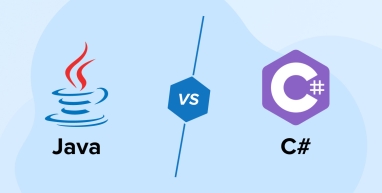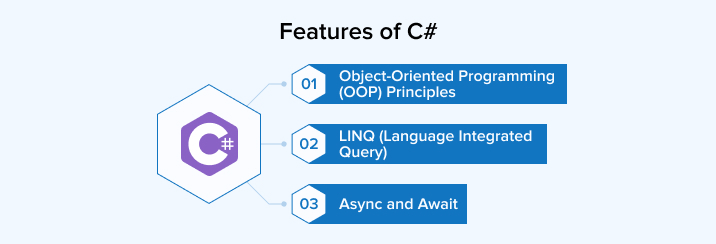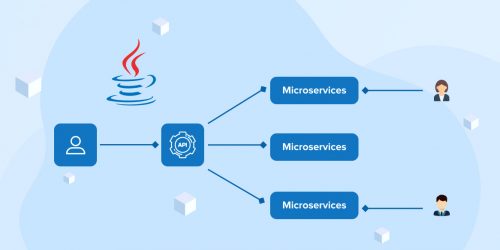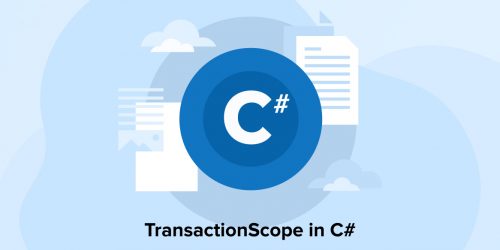Related Blogs

Selecting a programming language for an upcoming project is a crucial decision. The right language can ensure smooth progress, whereas the wrong choice can stall or even cause the project to fail. Therefore, you must be thorough when analyzing Java vs C#.
Both Java and C# are robust and popular languages with large communities and extensive ecosystems. They are used for building mobile apps, desktop apps, cloud apps, big data processing, and more. Both are general-purpose languages and have similar syntax.
However, certain differences in their capabilities lead them down different paths or make them suitable for various types of projects. This article provides a detailed comparison between both to help you make an informed decision on whether to hire C# developers or an expert Java development company for your next project.
1. Java Overview
Java is an object-oriented programming language developed by Sun Microsystems in 1995. Its “Write Once, Run Anywhere” principle makes it one of the most widely used languages across the world. Allow developers to write the Java code once, compile it into bytecode, and run it on any Java-based platform without recompilation.
Java is a versatile programming language widely used for developing complex web and mobile applications, Internet of Things (IoT) solutions, big data processing, artificial intelligence (AI), and blockchain solutions. Java is supported by a large community and comes with a wide range of tools and libraries.
2. Features of Java

Java is considered both efficient and effective due to the variety of features it offers. This section explores a key feature of this exceptional programming language.
2.1 Secure
Java offers robust features such as data encryption to address security issues like impersonation, eavesdropping, tampering, virus threats, etc. External programs can’t access memory locations without appropriate authorization. Java’s access modifiers control memory access. The programming language is so secure that it doesn’t allow any viruses to enter the applets. Moreover, Java doesn’t allow developers to use pointers explicitly.
2.2 Platform Independent
The Java programming language is compatible with most platforms and operating systems. The “Write Once, Run Anywhere” WORA principle enables Java developers to create programs that can run on any system without any kind of configuration. All you need to do is use the Java Virtual Machine to compile Java code into bytecode.
Only the JVM can understand this bytecode, and every device or system has one. So, all operating systems can read the bytecode, translate it, and run the program seamlessly without any modification.
2.3 Multi Threading
The multi-threading feature in Java allows developers to create apps that can handle multiple tasks simultaneously. A thread is a single sequence of execution performing executes a specific task. Meanwhile, Java programs can define multiple threads to execute multiple tasks simultaneously. Multi-threading uses the same amount of resources, such as memory, as required for a single thread. In short, they share common resources and are important for developing web and multimedia applications.
3. C# Overview
C# is a type-safe, component-oriented programming language. It is an integral aspect of Visual Studio and runs on .NET platforms. Developers utilize this programming language to build web, mobile, desktop, Windows, and distributed applications.
C# offers a wide range of modern programming features, while maintaining a quite simple syntax. A small learning curve allows developers to quickly get started with the language. C#’s can effortlessly adapt to market changes and user preferences through its versioning capabilities. It helps the language to evolve without risking its compatibility.
4. Features of C#

C# boasts a wide range of features that make it a robust and versatile programming language. Let’s understand some of its key features:
4.1 Object-Oriented Programming (OOP) Principles
C# is an object-oriented programming language that fully supports key concepts like abstraction, encapsulation, polymorphism, inheritance, and classes. These principles enable developers to create reusable, modular, and easy-to-maintain code. Adherence to OOP principles makes C# an excellent choice for building mobile, desktop, and web service-based applications.
4.2 LINQ (Language Integrated Query)
LINQ in C# allows developers to query and manipulate data from various sources through a uniform syntax. This robust feature helps make data intuitively understandable, improving code readability and promoting code reusability.
LINQ simplifies data access and manipulation. It uses a consistent language with an SQL-like syntax for querying and processing data from multiple databases. LINQ also offers standard query operators to support data operations like sorting, filtering, aggregating, and grouping.
4.3 Async and Await
Responsiveness is necessary for modern apps. The async and await keywords in C# enable efficient handling of time-consuming activities, like querying databases and downloading files, without blocking the main thread. This feature allows your app to perform other activities while running time-consuming activities in the background.
With the help of Async and Await, your app can multitask or run multiple processes while waiting on the initial action to complete without hurting the speed or performance of the application.
5. Java vs C# – A Detailed Comparison
Although many similarities exist between the programming languages, there are some notable differences. Understanding them would help you pick an appropriate language for the project. Therefore, this section compares both C# and Java against critical parameters.
5.1 Performance
The speed and resource management capabilities determine if it is the right option for building high-performance apps. C# is popular for its excellent performance because it compiles the programs directly into native code. C# based apps are unusually fast when running on the Windows operating system. C#’s JIT compiler ensures minimum load on the CPU.
Java is often considered slower than C# because Java programs are compiled into bytecode, which runs on the JVM. Even with the updates, JVM still takes too much time, and consumes more memory than C#. Therefore, Java apps take time to load, which also affects their operability.
5.2 Platform Independence
C# was primarily used for Windows development, but became a platform-independent language after its integration with the .NET Developers can now use C# to create apps that run on multiple operating systems, including Windows, Linux, and macOS. C# programming language also works well with Xamarin, offering capabilities to develop mobile apps for both Android and iOS platforms.
Java was designed as a cross-platform programming language. Every operating system comprises a Java Virtual Machine, and that’s the only thing this language needs to build a compatible application. It truly follows the “Write Once Run Anywhere” principle. The Android Software Development Kit, which enables Java developers to create Android applications, is a critical option in the domain of mobile development.
In short, C# works well for Windows and the .NET ecosystem, but if you are looking for a more mature solution with better platform compatibility, Java is the way to go.
5.3 Security
Both C# and Java are statically typed languages, which helps eliminate errors that might be generated from using the wrong data type. Their code is automatically verified during compilation to ensure they are correctly typed before execution. Java comes with JRE as its security manager, responsible for enforcing security standards, including the safe use of third-party libraries.
On the other hand, .NET provides security patches and implements robust security measures like authorization and authentication to help protect applications against potential threats. However, C# is more vulnerable to SQL injection and command injection attacks, leading to security failures.
5.4 Libraries and Frameworks Support
C# offers numerous libraries within the .NET and .NET Core frameworks, including ASP.NET for web app development, Windows Presentation Foundation for desktop apps, and the Entity Framework for ORM. C# is widely used with game development engines such as Unity and MonoGame.
Java also comprises a rich set of libraries and frameworks, catering to a wide range of development purposes. Spring and Hibernate are among the most popular Java frameworks used for building robust and scalable enterprise applications. Developers can use JavaFX and JavaServer Faces to fulfill their web and GUI-related requirements. Meanwhile, the Android SDK helps Java developers with mobile app development.
5.5 Community
Java is one of the oldest programming languages. As a result, it has big and active communities and one of the most mature ecosystems. The language offers a large array of resources for beginners and experts alike. You would find numerous community-run forums, tutorials, and blogs on the internet.
With strong support from Microsoft, C# can easily boast a large and strong community. Microsoft offers extensive documentation and support for developers. Additionally, various forums, tutorials, and blogs are available online centered around the .NET ecosystem.
In short, both languages have large communities that actively contribute to their advancement.
5.6 Syntax
The programming language’s syntax determines the code readability, ease of use, and developer productivity. C# has a syntax similar to the C language. So, developers familiar with C-style languages can easily work with C#. Its syntax includes semicolons to end statements and curly braces to form code blocks. C# also generates an intermediate code and comes with a Garbage Collector, just like C-style languages.
Java also has a syntax similar to the C language. So, it uses the same semicolons to terminate statements and curly braces to define code blocks. However, there are a few differences. Java comprises a built-in automation processing that is lacking in C#. Moreover, Java utilizes get/set methods instead of using properties like C#.
The similarities in syntax of these programming languages allow developers to easily switch between C# and Java whenever required.
5.7 Memory Management
For memory management, C# relies on the Common Language Runtime. It automatically frees up unused memory using a garbage collector. CLR simplifies the memory management process and prevents any memory leaks. It reduces memory fragmentation and helps maintain application performance by efficiently organizing memory allocation and reclamation.
The Java Virtual Machine manages memory for the Java programming language. Its garbage collector tracks object references and removes the unused objects. JVM categorizes objects into different generations: newly created objects and old ones that are in use for a longer period. Garbage collection cycles in Java are less frequent.
6. C# vs Java – Comparison Table
The detailed discussion has surely given you a deeper understanding of the benefits and challenges of working with both programming languages. To help you make an informed decision and pick a suitable language for your development project, this section provides an at-a-glance comparison of Java vs. C#.
| Parameters | C# | Java |
|---|---|---|
| Syntax and Ease of Use | The syntax is modern and concise, but the language is somewhat difficult due to its advanced features. | Simple syntax and beginner-friendly language. However, the code can be very verbose. |
| Concurrency | Task Parallel Library (TPL), async/await | java.uti.concurrent, ForJoinPool |
| Native interoperability | Platform Invocation Services (P/Invoke) | Java Native Interface (JNI) |
| Programming paradigm | Class-based and object-oriented | Functional, strongly typed, object-oriented, and component-based. |
| Installation | Need a rich set of libraries to code in C#. | Need the Java Development Kit to run |
| Conditional compilation | Supports conditional compilation | Doesn’t support conditional compilation |
| Runtime environment | Common Language Runtime | Java Virtual Machine |
| Costs | High licensing costs | Low costs |
| Learning curve | Need to be familiar with C-style languages | Language is strongly typed and requires a deeper understanding of object-oriented concepts. |
| Security features | Offers .NET security features along with Code Access Security | Ensures robust security through a Security Manager and type checking |
7. When to Use Java
Java developers can use the programming language for projects related to:
- Desktop applications: Java offers frameworks like Swing and JavaFX to build desktop apps.
- AI: Java offers various machine learning libraries that help build AI-powered applications.
- IoT: Java is considered an ideal option for programming sensors and hardware used in IoT applications.
- Big data: Java provides robust data processing engines capable of handling complex data sets in real-time.
- Cloud Computing: Java’s adherence to the “Write Once, Run Anywhere” principle makes it a top contender for building decentralized cloud apps.
8. When to Use C#
C# is a versatile programming language that can be used in a wide range of projects, including:
- Web App Development: C# developers can leverage the .NET ecosystem to build dynamic websites and web applications.
- Gaming Apps: The Unity Engine, which uses C#, is a robust game engine with over 1.5 million active users worldwide. It helps create high-performance games.
- Database Integration: For app development, C# uses frameworks like Entity Framework and ADO.NET, which allow you to connect with various databases, including MySQL, SQL Server, and Oracle.
- Desktop apps: C# uses UWP, WPF, and Windows Forms to provide desktop app development and Windows services capabilities.
- Cross-Platform Applications: The rich ecosystem of C# comprises frameworks like .NET MAUI and Xamarin that help create cross-platform applications. Xamarin helps build mobile applications for Android and iOS.
9. Conclusion
Java vs C# is not the debate about deciding which one is the best programming language; it’s an evaluation on finding the best-suited option for your project. Both Java and C# are general-purpose, object-oriented programming languages. Both are popular and supported by a large community. Even their syntax is similar to C-style languages. However, both languages possess some unique traits or features that make a few critical distinctions.
This blog explored those differences in detail and discussed real-life use cases of each language depending on their strengths and weaknesses. This would certainly help you pick an appropriate programming language for your upcoming project. Feel free to reach out in case you have any further queries.
FAQs
Which is better, Java or C#?
Both C# and Java have been known to maintain stable performance over the years. However, C# works faster on Windows and, if used alongside Microsoft tools, can boost developer productivity significantly. Meanwhile, Java is highly compatible.
What can C# do that Java cannot?
Java doesn’t support pointers for overloading, but C# does. Java doesn’t support any kind of pointers, whereas C# supports pointers when run in unsafe mode. C# is considerably faster compared to Java. Arrays are a specialization of the system in C#, and a specialization of objects in Java.

Vishal Shah
Vishal Shah has an extensive understanding of multiple application development frameworks and holds an upper hand with newer trends in order to strive and thrive in the dynamic market. He has nurtured his managerial growth in both technical and business aspects and gives his expertise through his blog posts.
Related Service
Java Development Services
Learn more about Java development services
Know moreAbout Java Development ServicesSubscribe to our Newsletter
Signup for our newsletter and join 2700+ global business executives and technology experts to receive handpicked industry insights and latest news
Build your Team
Want to Hire Skilled Developers?





This comprehensive comparison delves into Java versus C#. Having gone through this article, it's evident that each language possesses distinct features. However, determining the most suitable language for a specific application depends entirely on the nature of that application.
Mind blown by your in-depth Java vs. C# breakdown! This comparison laid out both sides beautifully. Everything from A to Z, similarities, quirks, pros and cons - crystal clear. This blog seriously leveled up my language decision making.